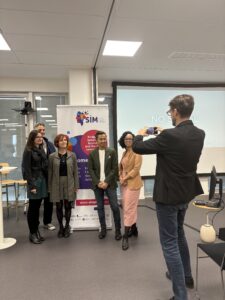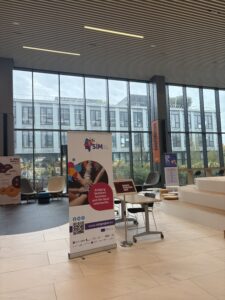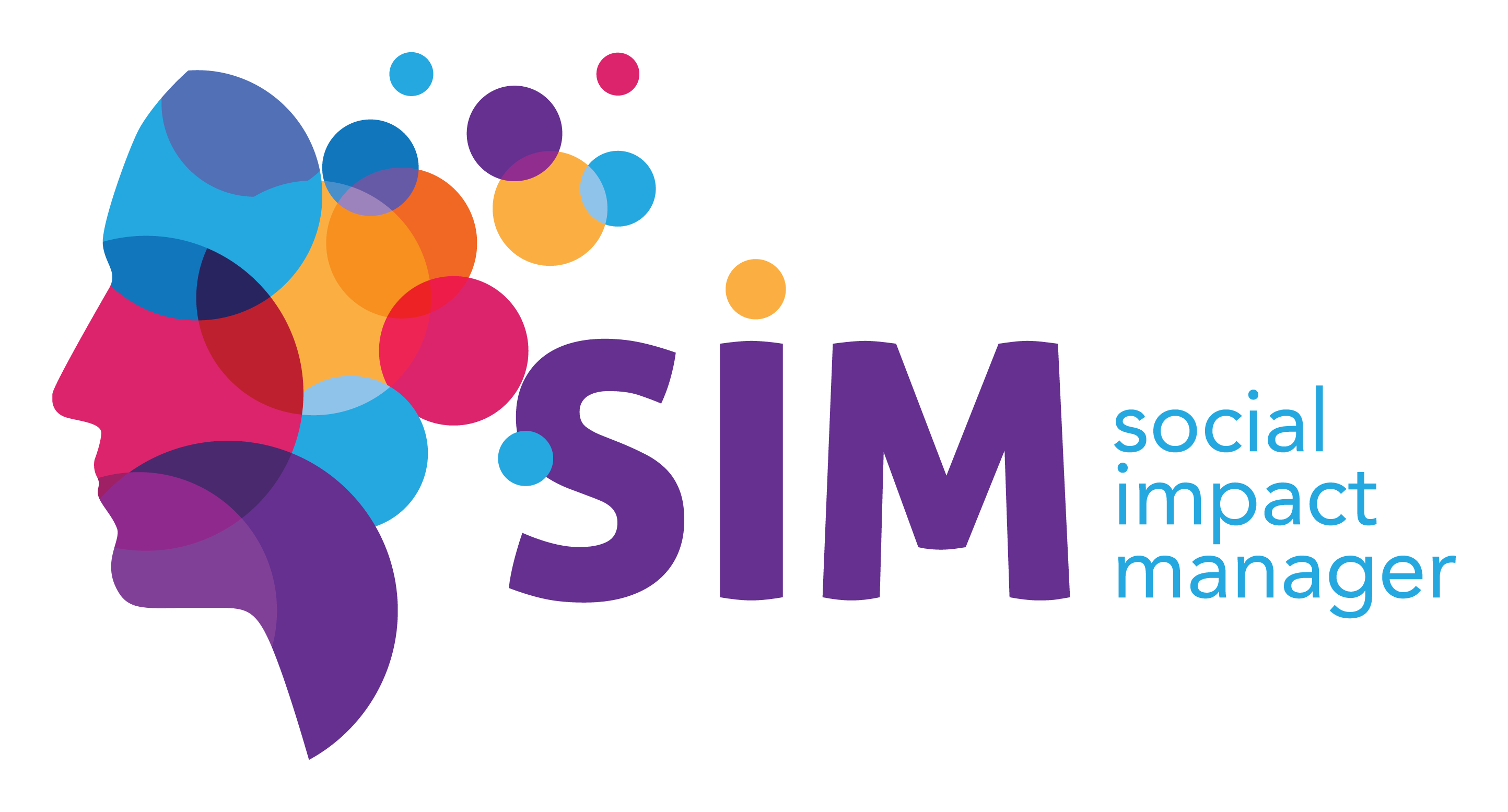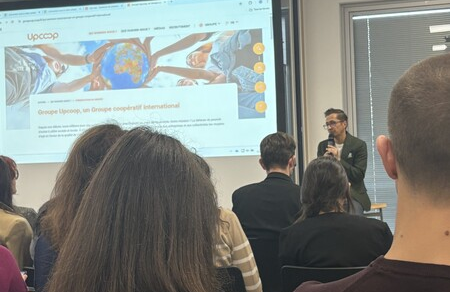 The final day of the SIM International School brought participants to the headquarters of Up Coop, one of France’s most respected cooperative enterprises and a recognised international leader in social innovation. Founded in 1964, Up Coop now operates in more than 25 countries and employs over 3,200 people, showing how a cooperative can achieve scale while remaining deeply anchored in social purpose.
The final day of the SIM International School brought participants to the headquarters of Up Coop, one of France’s most respected cooperative enterprises and a recognised international leader in social innovation. Founded in 1964, Up Coop now operates in more than 25 countries and employs over 3,200 people, showing how a cooperative can achieve scale while remaining deeply anchored in social purpose.
Participants and partners were warmly welcomed by the Up Coop team and introduced to the organisation’s history, structure and values with an emphasis on balancing financial performance with democratic governance, ensuring that employees, communities and clients all share in the value created.
Participant learned of Up Coop’s role in managing food and meal vouchers. Originating in France in the 1960s, meal vouchers there (and many other European countries) are not social welfare in the traditional sense. They’re a tax-efficient employee benefit, essentially a clever mechanism that aligns social good with economic incentive. Here’s how it works:
- Employers give workers “meal vouchers” that can be used to pay for food in participating cafés, restaurants, bakeries or grocery stores.
- Both the employer and the employee share the cost. For example, the employer might pay 60%, and the employee 40%.
- The employer’s contribution is tax-deductible, and the employee’s portion is exempt from income tax up to a limit.
- Small local businesses benefit because vouchers can only be used in registered outlets, keeping money circulating within local communities.
- It’s a socially responsible model of consumption. Workers get real value, employers enjoy tax benefits, and local economies are strengthened.
 Up Coop are a key part of social welfare and economic life in their operating countries, with offerings specifically tailored to each local ecosystem. Their strength lies in the power of local collaboration, working with municipalities, trade unions, businesses and community groups to design solutions that respond to real social and economic needs. For SIM participants, this approach echoed the essence of the Social Impact Manager role: understanding local realities, building bridges between sectors and translating shared values into practical action.
Up Coop are a key part of social welfare and economic life in their operating countries, with offerings specifically tailored to each local ecosystem. Their strength lies in the power of local collaboration, working with municipalities, trade unions, businesses and community groups to design solutions that respond to real social and economic needs. For SIM participants, this approach echoed the essence of the Social Impact Manager role: understanding local realities, building bridges between sectors and translating shared values into practical action.
COVID-19 meant that social innovation was needed more than ever. We learned how, during the pandemic, Up Coop adapted rapidly to digital vouchers and new delivery models, maintaining access to food services and protecting jobs when many sectors were under pressure. This responsiveness shows how agility and solidarity can reinforce one another, a lesson that resonated strongly with SIM participants, whose role is to drive that same balance of purpose and performance in their own organisations.
 Always innovating, wellbeing vouchers (and related services) are a newer branch of Up Coop’s activity. Building on the same cooperative logic as meal vouchers, they allow employers to support employees’ access to activities and services that improve quality of life, such as sport, culture, childcare, sustainable mobility or health and wellness programmes. For SIM participants, it was a powerful illustration of how a business model can drive both economic and social resilience.
Always innovating, wellbeing vouchers (and related services) are a newer branch of Up Coop’s activity. Building on the same cooperative logic as meal vouchers, they allow employers to support employees’ access to activities and services that improve quality of life, such as sport, culture, childcare, sustainable mobility or health and wellness programmes. For SIM participants, it was a powerful illustration of how a business model can drive both economic and social resilience.
Trade unions also play a cental role in Up Coop’s governance. As part-owners and active members of the cooperative, union representatives participate in strategic decision-making, profit distribution and social dialogue. This shared ownership model ensures that worker perspectives remain central to corporate strategy and keeps solidarity and inclusion at the heart of business operations.
Throughout the visit, participants reflected on how closely the Social Impact Manager role aligns with this approach, bridging (one of the great explainer words in the SIM project) business strategy and social value, embedding ethical decision-making into structures and ensuring that performance and purpose advance together. Even on the metro, the conversations kept going; a blur of reflections, new friendships and plans scribbled between stations. A few tired smiles, a lot of laughter, and the shared feeling that something important had begun. Participants compared notes, shared takeaways and imagined how to apply what they had seen at Up Coop within their own organisations and communities.
 So, as the SIM International School drew to a close, there was a sense of quiet satisfaction and shared pride. Three demanding and energising days together had turned ideas into something tangible. What began in national trainings now feels alive through this first generation of Social Impact Managers, already applying their learning in real settings. Before parting ways, several participants recorded short video reflections, honest, thoughtful and full of momentum. We will share them with you soon.
So, as the SIM International School drew to a close, there was a sense of quiet satisfaction and shared pride. Three demanding and energising days together had turned ideas into something tangible. What began in national trainings now feels alive through this first generation of Social Impact Managers, already applying their learning in real settings. Before parting ways, several participants recorded short video reflections, honest, thoughtful and full of momentum. We will share them with you soon.
Huge thanks to our hosts at Panthéon-Sorbonne University, led by Patricia Vornetti, Maître de conférences in Economics, supported by Sonia Laala and their dedicated team. Organising an international event is not for the fainthearted, but every detail reflected the true spirit of French hospitality, as well as the tradition and values of one of Europe’s most historic and internationally respected public universities, known for its excellence in law, economics, social sciences, and humanities and for its strong tradition of civic engagement and intellectual independence. Merci pour votre accueil, votre générosité et votre esprit européen.
#SIMProject #SocialImpactManager #Erasmus #SocialInnovation #ESG #ImpactLeadership #PanthéonSorbonne #Paris

